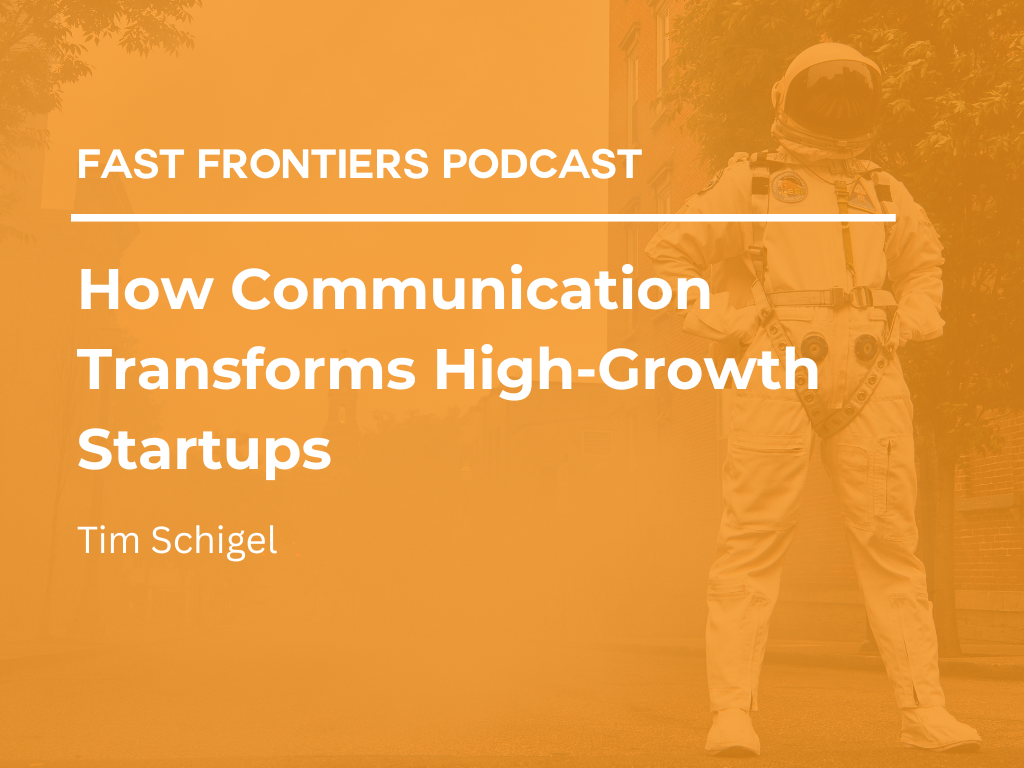We all know how important communication is when it comes to interpersonal relationships, but it’s just as vital to the continued health and success of business and professional partnerships.
Guest experts Jeff Bloomfield and Stephany Lapierre joined us recently to discuss this topic and share their insights on two of our Fast Frontiers podcast episodes. Read on as we explore how in-depth communication can transform and benefit companies, especially high-growth startups.
Communication as a Factor of Success
Jeff Bloomfield is a CEO, author, speaker, growth expert, and “brain enthusiast“ who has dedicated his life to empowering individuals and companies to overhaul their sales and marketing systems by understanding the power of neuroscience on everyday communication. It’s a fascinating concept, and he shared his unique insights with us during a recent podcast interview.
During the episode, we were able to do a deep dive into the reasons why Jeff started his company Braintrust in the first place. It’s an inspiring story that begins with his beloved Papaw—a gifted communicator and mentor—and continues to this day. Jeff also spoke about why he feels communication is the most important determining factor of success for a person or an organization. In a nutshell, he maintains that if you can’t communicate effectively, you’re not going to get too far in the world. He believes this is true not only in business and professional relationships, but in every other area of your life as well.
Simply put: Communication is key.
We were excited to broach this topic of how neuroscience applies to communication—and how you can parlay all of that information into elevating your business as an entrepreneur—since it’s a new frontier that hasn’t been explored much up until now.
One of the first insights Jeff shared was how his Papaw’s unique style of communication affected his perspective on it—as well as his career. How he essentially turned the tables when it came to the expectations of his superiors and colleagues when he was first starting in the industry (a practice he continues to relish to this day).
Reflecting on his early days in sales, Jeff recalled the typical behavior of his bosses at the time. “They would take you on as a drug rep or salesperson in your first territory in the home office, and then they would quarantine you for three weeks, way before quarantining was the cool thing to do. Then they would teach you everything you needed to know about cell biology, cell proliferation, and randomized, placebo-control—as much data as this farm boy’s head could hold!
“Then they would send you out into your territory and say, ‘Hey, go tell all this to the oncologist and they’ll write this drug.’ And I used to think to myself, that’s the opposite of how Papaw communicated. He was a connector and a teacher, and he was also a storyteller. And so that’s how I communicated too.”
Jeff went on to explain that although he knew his stuff—all the data and facts about the prescription drug he was selling, he never led with it. “I always told stories and I connected. And then, when I was a teacher [for the reps?], I would teach them things I didn’t think they would know. And my numbers went through the roof. I kept getting promoted, and nobody could figure it out. They kept saying ‘he just communicates the opposite of the way we train him.’ And then they asked me to help build a team to launch a drug for brain cancer. So this was the point in my life where I started to see some things come together.”
Seeing this, something clicked in Jeff’s head, and he became intrigued with how it all fits together on a cognitive level. “Because I’m a nerd, I love to dive into research, and so I started diving into neuroscience and neuropsychology. Initially, it was just to see how the blood-brain barrier interacted with our drug. But what I started to discover was, as technology advanced with functional MRIs, EEGs, and PET scans, we were able to take a look inside the brain more than we’ve ever been able to do before. And most of the folks who understood what was being discovered were using it for either academic purposes or medical purposes, and no one was looking at it through the lens of—wait a minute, 99.5% of the rest of the world are out there just communicating for a living. What does this mean? How does the brain work relative to communication?”
And the result of all that research? Enter the creation of Braintrust. “We were training people, myself included, my entire career, in a way that was counterproductive to how we are biologically built to change. And that was the impetus for me to start Braintrust eleven years ago, to teach people just enough about the latest science to help them understand and open up their minds—pun intended—into how we process information. So they can be a better communicator, both personally and professionally.”
When we asked Jeff why this is so important in today’s economy and society, he was straightforward: “I’ve been saying this for a long time now. The number one determining success factor for a person, individual, or organization is how you communicate. Can you communicate effectively? And it doesn’t matter what sphere you’re in. It can be personal relationships, marriage, being a parent, or it can be a VC company. You’re trying to go recruit investors. It could be a tech company trying to raise dollars. It doesn’t matter. If you can’t communicate effectively, you’re sunk, in every area of your life.”
How to Articulate Your Position
It’s easy to agree on the extreme importance communication has on entrepreneurial and business success, but people often still find themselves at a loss as to what actual steps to take to get there. Luckily, in Stephany Lapierre’s podcast episode, the CEO of the successful data supplier foundation TealBook helps us unlock this mystery. Specifically, she explains why cultivating the appropriate articulation of your position is a bang-up way to begin.
One of the biggest takeaways from our conversation is Stephany’s insistence on the importance of finding the right market positioning for your company and brand. Stephany and her Tealbook team had to do this with their brand, and she told us about her time at a conference that brought together all of the CPOs of the largest companies in the world. She asked them a simple question: “Do you feel you’ve got good quality and complete supplier data today? I’m not talking about transactional, not even spend data. I’m talking about all the information you need to know about who you do business with.”
In response, everyone laughed. Stephany then gave them a follow-up query, presenting her brand and putting it in a perfect position by asking: “Okay, raise your hand if you believe that having good quality and complete supplier data is critical to your digital transformation?”
Everyone in the audience raised their hands.
This is a great example because after Tealbook had figured out its market fit, they still had to change the way they talked about what they did to make people instantly have that “aha moment” and get what the company could offer them—and why they had to have it.
According to Stephany’s example, it takes time to get everything moving in the right direction, so being able to articulate your position and opinion in a way that makes everyone’s proverbial hand go up in the air—wanting your solution— is the real recipe for success.
Creating Success by Talking About What You Do
During our discussion with Jeff, he provided us with a favorite quote of his that will appeal to all of the tech entrepreneurs out there, which comes from none other than the genius Albert Einstein.
“If you can’t explain it simply, you don’t understand it well enough.”
Once we have done the due diligence of truly understanding our brand and what we are bringing to the table, as well as the hard work of grappling to position ourselves and find that right market fit, we still have to be able to tell people all about it—and us—in simple terms that can be easily understood and translated. And we want that translation to be universal.
Something along the lines of: “We have what you need and have been looking for, even if you didn’t know it previously.”
Written by Tim Schigel



